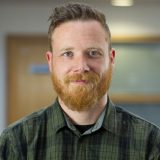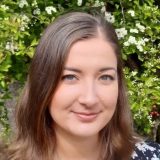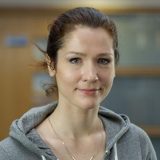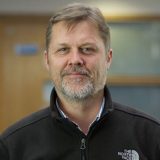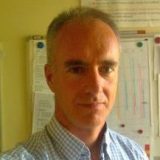Gabriel researches the effects of environmental change on the structure and functioning of ecosystems (which comprise groups of species, their interactions with one another and with the physical and chemical environment in which they exist). His work spans multiple levels of biological organisation, from sub-cellular biochemistry to the dynamics of ecosystems, and searches for similarities across aquatic and terrestrial systems. The ultimate goal of his work is to develop a predictive ‘tool box’ to forecast how ecosystems will change in a world increasingly dominated by humans and the oceans.
Michiel vos
Michiel combines approaches from microbiology, evolutionary ecology and population genomics to study bacterial evolution, focusing on horizontal gene transfer, sociomicrobiology and pathogens in the environment. Key projects include exploring the ecological drivers of antimicrobial resistance and virulence in aquatic bacteria.
Rod Wilson
Rod is a comparative physiologist. He aims to provide a more holistic understanding of homeostasis in aquatic animals, both fish and invertebrates, freshwater and marine. This includes studies of how anthropogenic and natural environmental changes impact upon physiology and behaviour in the wild, and how to use physiology to help improve the sustainability of aquaculture (including animal growth efficiency and health, pathogen/parasite resistance, and farm effluent output). He also studies the reverse process: how physiological processes in aquatic animals can influence the regional and global environment in freshwater and the oceans.
Charles tyler
Charles is a reproductive physiologist and environmental biologist. His research interests include mechanisms of endocrine disrupting chemicals and nanoparticle ecotoxicology and assessing population level effects of contaminants in wildlife (primarily fish).
Eduarda santos
Eduarda is an environmental biologist investigating reproductive development and function and the susceptibility of these processes to disruption by environmental stressors. Her research focuses on fish and has ranged from investigating the endocrine control of reproduction to addressing the population level effects of chemical exposure for wild fish, using systems biology strategies.
Aimee Murray
Aimee’s research area is antimicrobial resistance in the environment, particularly due to anthropogenic impacts in wastewater and receiving environments. This includes evolution and ecology of antimicrobial resistance, direct selection at low concentrations and co-selection by other antimicrobials and non-antimicrobial compounds, environmental risk assessment, and developing and validating the novel ‘SELECT’ method for rapid determination of selective concentrations of antibiotics and environmental surveillance of antimicrobial resistance. She has a long-standing collaboration with AstraZeneca and engaging with industry and policy makers.
chris lowe
Chris is an aquatic Microbial Ecologist (mainly marine). He looks particularly at algal bloom impacts on shellfisheries (e.g. mussel farms) and reservoirs. He is an expert in Cyanobacteria, working with Canadian partners. His focus is on ecological implications rather than applied science. He has close ties with Plymouth Marine Laboratories, where single cell culture takes place and linked to genomics.
anne leonard
Anne’s research focuses on marine systems and epidemiology. She studies catchment-level processes contributing to the transmission of antibiotic resistant bacteria in coastal bathing waters, with a view to identifying mitigation strategies to reduce the spread of antibiotic resistant bacteria in the environment. She is particularly interested in recreational waters, transmission in coastal bathing waters and microbial genes associated with land uses and re-use of water and crop irrigation.
will gaze
Will research is in antimicrobial resistance in farmed and natural environments, including major elements of environmental sampling and wide-ranging analytical methodologies. This includes AMR evolution in the environment, using in situ and in vivo experiments, landscape scale dissemination of AMR and human exposure and transmission studies. Projects are divided into three main themes: ecology, evolution and public health perspectives. These map onto those identified in successive WHO, EU and UK AMR action plans facilitating interdisciplinary research approaches and joined up thinking.
Ross Brown
Ross’ research focuses on refining environmental risk assessment approaches to safeguard aquatic ecosystems from pollution and to facilitate the sustainable development of aquaculture.
Philip Salmon
Philip investigates the atomic scale structure and dynamics of liquids and glasses. The systems that he investigates include water and both aqueous and non-aqueous solutions, where subjects of interest include the nature of ion-solvation and the properties of hydrogen bonded networks (e.g., quantum effects) under ambient or extreme (hydrothermal) conditions. Other systems of interest include oxide and chalcogenide glasses at both ambient and extreme (high pressure and temperature) conditions, and the adaptation of these glasses for photonic and battery applications. Extensive use is made of both neutron and x-ray scattering methods. Sample preparation tools include a high-pressure and temperature press, and sample characterisation methods range from calorimetry to hardness testing.


